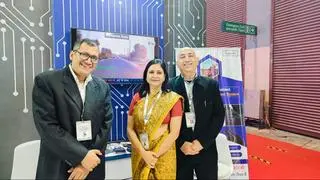He started out as an aeronautical engineer, helping in the designing of a fighter plane. Tarun Joshi’s dreams, however, were waiting in the hangar, eager to take off.
From helping build fighter aircraft to private equity to an aspiring entrepreneur, Tarun has had many routes to learning.
Born with a veritable silver spoon in his mouth, Tarun was eager to get his hands dirty, metaphorically, and dabble in value creation and innovation.
Early days
Completing his aeronautical engineering from Punjab Engineering College in Chandigarh, Tarun did his MBA from ISB in Hyderabad. “At the DRDO in Bengaluru, I designed products for the Tejas aircraft,” says Tarun, who hails from Rajasthan. Tejas is a multi-role light fighter jet.
“From 1998-2002, I was with the DRDO. The Tejas flight test was done and it was going into production. I was getting restless since most of the innovation stuff was over,” said Tarun. Post his MBA, he joined investment banking firm Citi to lead innovation. “I designed a biometric ATM for them in 2005. Little did I know that the thumb print design of that time would become a standard security feature in the future. The company launched the biometric ATM in six commercial places,” says Tarun.
It was at this point that Tarun woke up to his own potential. “I realised I could get around commercial enterprises easily in the private equity world. So, I moved from a private equity set up CVC (Citi Venture Capital) to an Europoean fund called 3i to lead their PE business in India,” says Tarun.
Along with his team, Tarun was instrumental in investing close to a billion dollars over nine years. Whilst at the firm, Tarun’s commercial acumen got better and he realised he had an ace up his sleeve. He identified gifting as tremendously innovative. “Despite Amazon and its billion-dollar plus sales, I realised that gifting is an art that is strong even in India and is one vertical where much innovation and creativity is required,” adds Tarun.
He decided to follow his calling. India Gifts Portal (IGP), a multi-category gifting company where Tarun was a majority investor while at UK-based PE firm 3i Group, showed huge potential.
In 2012, “rather than start from scratch, I acquired IGP. All the investments and buy-outs were pegged at ₹30 crore,” says Tarun.
IGP was previously a unit of IndiaMART, an online B2B platform for small and medium-size businesses. The aim of the buyout was to accelerate growth.
Parental support
With his parents active in the social sector, Tarun grew up in a household “with a strong NGO background. My mother works on income generation activities, though she has also worked for the World Bank. She founded the NGO which now has over 2,000 artisans from all over India making handicraft items.”
Some of the handmade pieces, understandably, make their way to the son’s gifting portal.
Latching on to the idea worked. Six years later, IGP boasts of a revenue of ₹60 crore, and has four offices in India and one in in California.
Funding dreams
Tarun does not believe entrepreneurs should fund their dreams from outside.
“I am not for funding since it leads to dilution. Funds tend to take all the decisions. If you look carefully, the first institutional round that comes in at start-ups tends to drive a lot of board decisions. I think the more one delays funding, the better it is for any founder,” he adds.
Speaking about his initial personal investment in IGP, he says, “both debt and equity is around $3 million. We did a first angel round in 2016, only from family and close friends. The Karamchand Group, the founder of Mortein, the All-out brand is an investor in his personal capacity.”
As for IGP, the business has been profitable. “When I started out, I was confident the business was going to grow to ₹20 crore in the first year. We achieved that. Similarly, over the next 4-5 years, we should be close to ₹200 crore. We have a clear growth strategy,” he adds.
Competition
Tarun insists he was tracking competiton and was also being tracked in the bargain. “In October 2016, Amazon globally launched a category called handmade gifts. I would like to think the company woke up to the potential by looking at our work,” he says.
“In India, artists are not computer literate and we are now on that journey. Currently, we have a network of over 2,000 artisans and two warehouses,” he said.








Comments
Comments have to be in English, and in full sentences. They cannot be abusive or personal. Please abide by our community guidelines for posting your comments.
We have migrated to a new commenting platform. If you are already a registered user of TheHindu Businessline and logged in, you may continue to engage with our articles. If you do not have an account please register and login to post comments. Users can access their older comments by logging into their accounts on Vuukle.